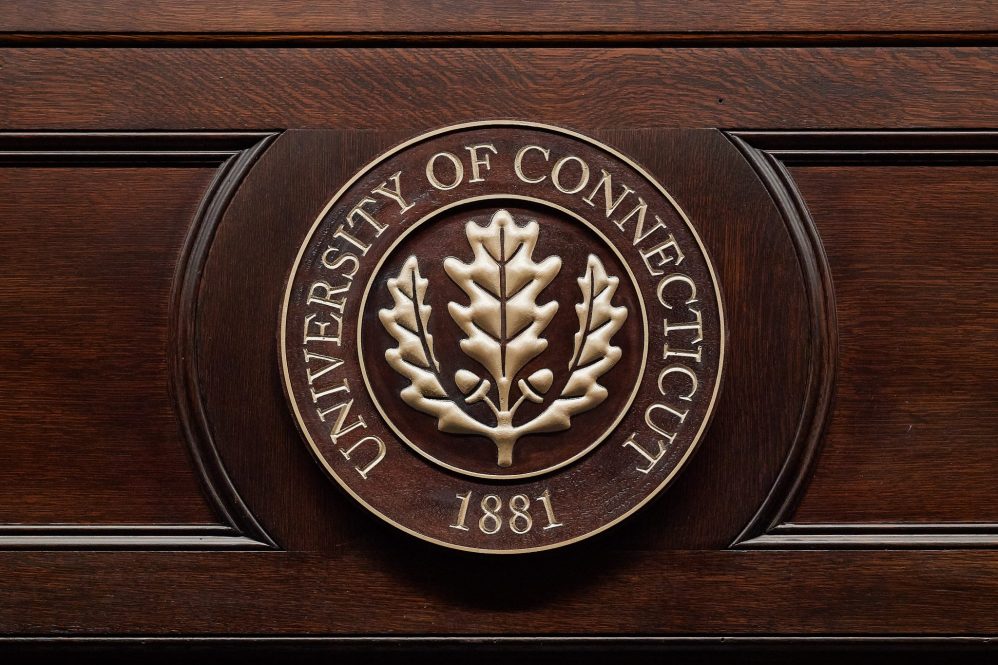UConn is entering the 2022 fiscal year with a brighter financial picture after a year of pandemic-driven uncertainty, although officials caution the University still faces an underlying structural deficit that is only temporarily assuaged in the new budget by COVID-19 relief funds.
The UConn Board of Trustees unanimously adopted the FY22 budgets Wednesday for UConn Storrs and regional campuses along with UConn Health, anticipating a nearly full return to on-campus operations after 18 months of reduced housing capacity, remote coursework, and research constraints due to pandemic conditions.
The FY22 budgets comprise $1.6 billion for UConn Storrs and regional campuses, and $1.39 billion for UConn Health’s medical, clinical, and academic operations. The new fiscal year starts Thursday and runs through June 30, 2022.
The FY22 budget for Storrs/regionals will be in balance because of the generous federal COVID relief support directly and through the state, and because of internal departmental cuts, officials say.
However, the underlying structural deficit will continue to be of concern as long as UConn’s annual state block grant does not keep up with inflation, and as long as the University and other state agencies must pay extra to help resolve the statewide unfunded pension and retiree health care liability that has built up over many years. For FY22, that net legacy cost charged to UConn and UConn Health will be about $95 million.
The state has been generous in helping UConn address its constraints despite the fiscal challenges it has had to face, UConn officials emphasize, including by providing many millions of dollars in extra state aid for UConn and UConn Health during the pandemic and moving forward.
“The level of support provided over the next two years demonstrates the state’s commitment to its outstanding public flagship, its students, research and clinical care enterprises, faculty and staff, and the pivotal role we play in the state’s economic recovery and long-term future,” Board of Trustees Chairman Dan Toscano said Wednesday.
In addition to adopting the coming year’s budget, UConn also ended the FY21 budget year in balance on Wednesday, having closed the original $75.5 million deficit it faced for the Storrs and regional campuses budget, largely due to loss of housing revenue and related fee-based income resulting from the pandemic.
Almost $45 million of the deficit was covered by internal cuts university-wide, including hiring and spending freezes; by individual departments; through management furlough days; and through reallocating capital projects. Federal and state COVID relief funds covered the remaining gap.
UConn Health also received strong state and federal fiscal support to help address deficits in its FY21 budget and is budgeted to receive additional allocations in FY22 in recognition of the pandemic’s impact.
For the Storrs and regional campuses, the University anticipates receiving $208 million in FY22 under its annual state block grant; and $201 million in partial reimbursement from the state to help cover fringe benefit costs for about 47 percent of its employees, with the University covering the rest.
Overall, state funds are expected make up about 26% of the Storrs/regional revenue in FY22, although tuition and fees bring in 29% and 18%, respectively.
The University will generate the remaining 27% through grants and contracts, commercial activities such as auxiliary services and sales, and related sources. UConn is also reducing department allocations by 2%, part of cost-cutting and economizing that has been taking place across the board.
UConn is not increasing students’ charges in the coming year for room, board, or the General University Fee (GUF) for FY22, keeping each of those categories flat. However, UConn will receive slightly less revenue from the housing categories than in a typical year because post-COVID occupancy will be around 85%, allowing the University to put aside rooms for medical isolation and treatment if needed.
The budget keeps most fees flat with modest increases in only a few categories, including helping the University significantly expand access to mental health services by adding more counselors and mental health educators. Those enhancements have been frequently requested by students and recently were recommended by the President’s Task Force on Mental Health and Wellness.
UConn is entering the third year of a five-year tuition adjustment plan adopted in late 2019, which limited increases to their lowest level in five years.
Under the FY22 portion of the five-year plan, in-state tuition will increase by 4.3%, or about $625. Those figures were calculated specifically to reflect the impact of state fringe benefit costs and state aid to UConn; inflation in the higher education sector nationwide; and related fiscal measures.
UConn continues to focus on protecting academic excellence and providing strong student support, including by increasing its financial aid budget for FY22 to a record $255.6 million, including $28.5 million in direct student federal COVID relief support.
All told, financial aid allocations in FY22 will be $67 million higher than in FY19, the last full pre-pandemic budget year.
Like the UConn Storrs and regional campuses, UConn Health enters FY22 with an operating budget that will continue to be impacted by rising fringe benefit rates beyond its control, largely due to the state’s unfunded pension and health care liabilities for state retirees.
However, UConn Health also has ramped up net patient revenue from the significant decline from the change in operations related to the COVID pandemic. UConn Health expects that to continue increasing, depending on factors such as payer mix, volume, shift of services from inpatient to outpatient, and other considerations.
“UConn Health will continue to manage its budget closely monitoring state support, clinical volume, and fringe benefits costs,” UConn Health Chief Financial Officer Jeffrey P. Geoghegan said. “We will also continue to focus on providing excellent patient care, protecting academic excellence, and supporting the research mission.”



